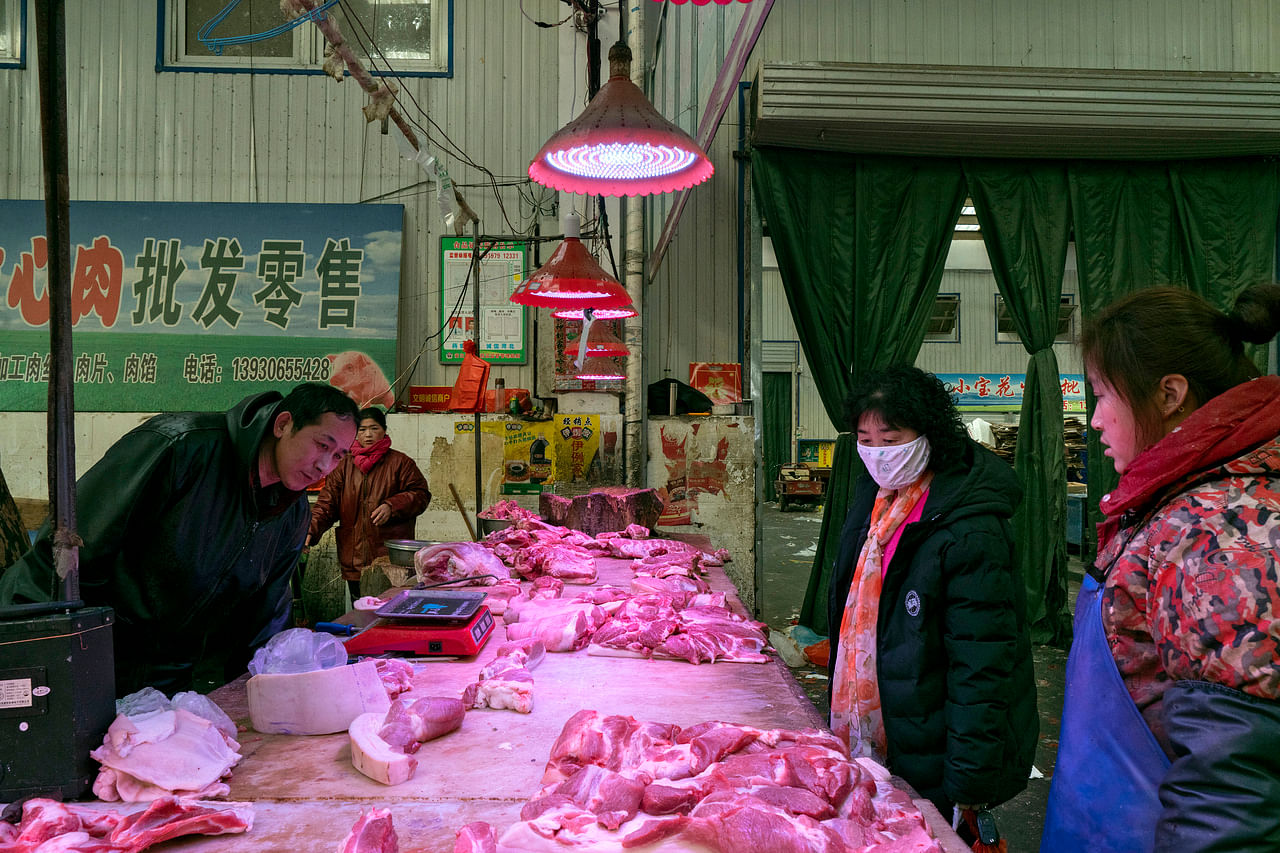In Chinese markets packed with wildlife, a stew of emerging viruses
Sign up now: Get insights on Asia's fast-moving developments

In a photo taken on Jan 11, 2020, members of the Wuhan Hygiene Emergency Response Team are seen leaving the closed Huanan Seafood Wholesale Market.
PHOTO: AFP
Follow topic:
LANGFANG, CHINA (NYTIMES) - The typical market in China has fruits and vegetables, butchered beef, pork and lamb, whole plucked chickens - with heads and beaks attached - and live crabs and fish, spewing water out of churning tanks. Some sell more unusual fare, including live snakes, turtles and cicadas, guinea pigs, bamboo rats, badgers, hedgehogs, otters, palm civets, even wolf cubs.
The markets are fixtures in scores of Chinese cities, and now, for at least the second time in two decades, they are the source of an epidemic that has spread fear, taxed the Communist Party bureaucracy and exposed the epidemiological risks that can spawn in places where humans and wildlife converge.
The novel coronavirus that has already killed at least 56 and sickened nearly 2,000 in China and around the world is believed to have spread from exactly one of these places: a wholesale market in Wuhan, a city in central China, where vendors legally sold live animals from stalls in close quarters with hundreds of others.
"This is where you get new and emerging diseases that the human population has never seen before," said Kevin J. Olival, a biologist and vice president of research with EcoHealth Alliance, a nonprofit research organisation, who has tracked previous outbreaks.
While the exact path of the pathogen has not yet been established, government officials and scientists said the new contagion had ominous similarities with the outbreak of Sars, or severe acute respiratory syndrome, in late 2002, which killed nearly 800 people and sickened thousands more around the world.
Now, as the government struggles to contain public anger over the outbreak, it is facing calls to do more to regulate or even ban the sale of wildlife - and growing questions about why so little has changed in the 17 years since Sars.
That disease was ultimately traced to a coronavirus that jumped from bats to Asian palm civets, a catlike creature prized as a delicacy in southern China, and then to humans involved in the wildlife trade there. According to officials and scientists, the new virus also appears to have originated in bats and made the jump to another mammal, though which one is not yet clear.
The latest outbreak - the scope of which is still unfolding - has led to calls inside and outside of China for better regulations or even an end to this kind of culinary adventurism. While turtle and boar meat are not uncommon in Chinese restaurants, game meats such as civet cats, snakes or pangolins tend to be considered specialties only in some regions. Their consumption is driven as much by the desire to flaunt wealth as by a mix of superstition and belief about the health benefits of wildlife.
Once the Huanan Seafood Wholesale Market in Wuhan was identified as the most likely source of this outbreak in December, the authorities promptly closed it, though it was not clear what happened to the animals that had been for sale there. Officials announced only on Wednesday that they had banned the sale of wild animals throughout the province. Two other provinces, Henan and Inner Mongolia, also imposed suspensions on the trade this past week.
On Friday, officials from three national agencies announced tighter controls, including a suspension nationally of the sale and transport of animals possibly linked to the new coronavirus. The statement specified only badgers and bamboo rats, a species of rodent found in southern China that lives in (and eats) bamboo thickets. Both had been advertised for sale in the market in Wuhan.
The flurry of government action came after an unusual outpouring of public sentiment against the trade of live animals. A campaign on Weibo, the social media platform, drew 45 million views with the hashtag #rejectgamemeat.
"Eating game does not cure impotence or have healing powers," Jin Sichen, a television presenter in Nanjing, a city in south-eastern China, wrote on his Weibo page on Wednesday. "Game not only doesn't cure disease, it can also make you, your family, friends and even more people sick." "One must be mentally sick to eat game in order to show off and flaunt," Jin added.
A group of 19 Chinese scholars also called on the government to do more to regulate the trade and the public to stop eating wild animals.

A market in Shenzhen, China, on July 15, 2016.
PHOTO: NYTNS
The Wildlife Conservation Society, an advocacy organisation based in New York, called for a global ban on the commercial sale of wildlife, especially in markets like those in China, saying that the latest outbreak proved the public health threat.
Christian Walzer, the organisation's executive director of health, said that the astonishing diversity of wild animals in markets like these, packed in small cages in crowded market stalls, created a perfect laboratory for the unintentional incubation of new viruses that can enter human cells. Viruses can be spread through saliva, blood or faeces. "Each animal is a package of pathogens," he said in a telephone interview.
But some Chinese consumers ascribe traditional medicinal benefits to the animals. Vendors and even officials in state news media have touted wildlife as alternative sources of protein and sources of revenue in impoverished regions. An article by the Xinhua News Agency last fall, for example, said that farming bamboo rats was helping to lift people out of poverty in Guangxi, another southern province.

Cuts of raw meat for sale at a market in Langfang, China, on Jan 23, 2020.
PHOTO: NYTNS
The epidemic has now put sellers on the defensive.
"Are you sure it is eating wild animals that has caused the epidemic?" said Zheng Ming, the sales manager of a company selling animals in Yichang, a city about 290km west of Wuhan. Until the ban on sales announced this past week, he sold porcupines, civets, guinea pigs and bamboo rats among others.
"We observe the law," he said. "This is a completely legal business."

